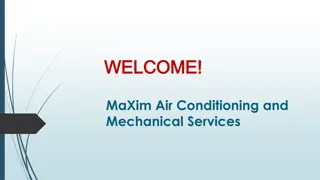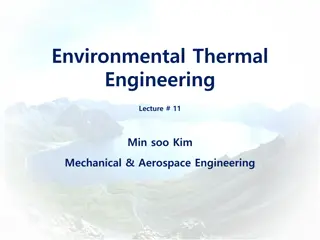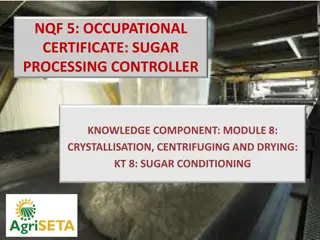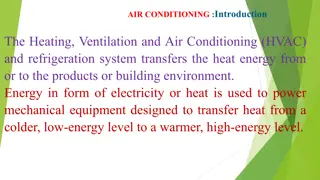Air-Conditioning - Terminology
Dive into essential terms like refrigeration cycle, evaporation, compression, condensation, refrigerant, and cooling capacity in air-conditioning systems. Explore the processes behind these terms and enhance your knowledge of how air-conditioners work efficiently.
Download Presentation

Please find below an Image/Link to download the presentation.
The content on the website is provided AS IS for your information and personal use only. It may not be sold, licensed, or shared on other websites without obtaining consent from the author.If you encounter any issues during the download, it is possible that the publisher has removed the file from their server.
You are allowed to download the files provided on this website for personal or commercial use, subject to the condition that they are used lawfully. All files are the property of their respective owners.
The content on the website is provided AS IS for your information and personal use only. It may not be sold, licensed, or shared on other websites without obtaining consent from the author.
E N D
Presentation Transcript
Important Terms Refrigeration Cycle Evaporation Compression Condensation Refrigerant Cooling Capacity
Refrigeration Cycle A Closed cycle of evaporation, compression, and condensation. Transfer of Heat energy between two environments.
Evaporation The process of liquid becoming vapor/gas and it takes place in evaporator coil of an air-conditioner. This part of the system gets cold to the touch (about 7 C/ 45 F) during it s operation.
Compression The process of reducing the volume of a gas/ vapor is called compression. The compressor pumps gaseous refrigerant to a high pressure and temperature.
Condensation The process of gas turning into liquid state is called condensation It allows refrigerant to transfer heat without mixing.
Refrigerant The working fluid in refrigeration cycle is called refrigerant. Modern AC's hydro flouro carbons that are inflammable, non-corrosive. Most widely used residential AC's nowadays are R32. refrigerant in
Cooling Capacity - Units Ton 01 Kilo Watts 3.6 BTUs/hr 12,000 BTU or British thermal unit is generally used to measure Cooling capacity. It can also be measured in Tons and Watts
Quiz 01 Ton is equal to? a) 120 Btus/hr. b) 1,200 Btus/hr. c) 12,000 Btus/hr. d) 120,000 Btus/hr.























